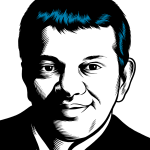Writing a novel “about” Bombay is undeniably a preposterous project. One could safely brick a house with recent Bombay tomes. But to set out to interview the city—as Suketu Mehta did for his book Maximum City—is its own kind of hubris.
For two years, Mehta made a daily ritual of touring the megopolis and recording the words of gangsters, policemen, bar girls, slumdwellers, and Bollywood directors on his beloved laptop. Many of these interviews turned into friendships: He co-wrote a script for the blockbuster Mission Kashmir. He got into a codependent (but nonsexual) relationship with a troubled bar girl. Once he was almost shot at by two gangsters in a hotel room.
The result is perhaps the greatest nonfiction book written about India. Maximum City: Bombay Lost and Found—a finalist for the Pulitzer Prize in 2005—has all the 3-D vividness of a Google Street View shot and the headlong arc of a sleek, journalistic, first-person account. Mehta, like Joseph Mitchell, is a silent interviewer, rarely stepping within quotation marks. He is adept at turning his nervy prose on himself, spinning the book into a study of the possibility—and frustration—of returning home to the city he left at the age of fourteen.
At present, Mehta, who is forty-five and comes from a family of Gujarati diamond merchants, is back in his second home, New York. Here, he is working on a book about immigrants in the city, preparing a new translation of Mahatma Gandhi’s autobiography, and also serving as a professor of journalism at NYU. His apartment, where we met twice for this interview, is on the twentieth floor of a faculty tower and bulges with excellent views of SoHo. Mehta appeared to make the most of this bounty: when an insect alighted on a bay window, he approached it quietly, crouched low, and stared through its wings at the sunlit rooftops spread out below. Then, as if this were a perfectly normal pastime, he directed me to do the same.
—Karan Mahajan
I. A SECOND MORNING
THE BELIEVER: I recently read Humboldt’s Gift by Saul Bellow—
SUKETU MEHTA: That’s a great book. Bellow is one of my gods.
BLVR: Mine too! In Humboldt’s Gift there are these long passages where Charlie Citrine is sitting on his couch in his socks riffing on the difficulties of being productively lazy. One problem of being a writer, it seems, is to create and then utilize opportunities for laziness.
SM: You know, Bertrand Russell wrote an essay extolling sloth. I think [that’s] the difference between civilized and uncivilized society—societies where the afternoon nap is a regular feature. I nap every day, wherever I...
You have reached your article limit
Sign up for a digital subscription and continue reading all new issues, plus our entire archives, for just $1.50/month.
Already a subscriber? Sign in





